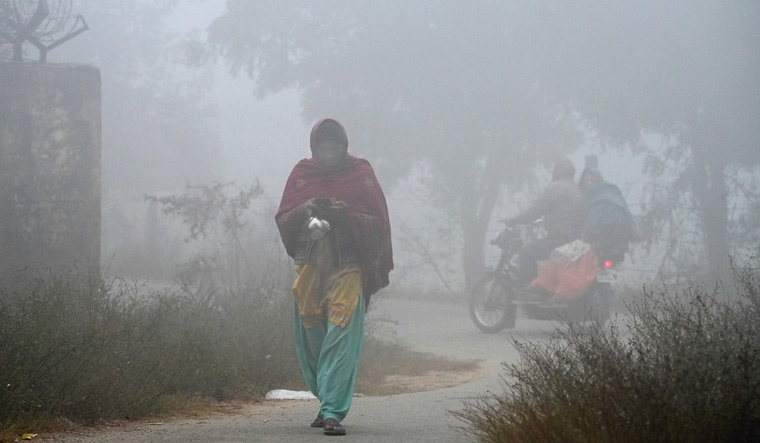Dense fog engulfs northern regions, with many states witnessing cold wave-like conditions with the temperature steeply dropping. On Friday morning, Delhi recorded the coldest morning of the season with the temperatures dropping to 5.3 degrees Celsius.
The dense fog engulfed the city and reduced visibility to 500 metres.
According to India Meteorological Department (IMD), the Safdarjung Observatory, the primary weather station in the national capital, recorded the minimum temperature at 5.3 degrees Celsius, three notches below the season's normal.
The Palam airport logged the lowest visibility level of 200 metres at 5:30 am. Visibility dropped to 500 metres at the Safdarjung airport at 5:30 am, the IMD said.
According to the IMD, very dense fog is when visibility is between zero and 50 metres, between 51 and 200 metres is dense fog, between 201 and 500 metres is moderate fog, and between 501 and 1,000 is shallow fog.
The maximum temperature is likely to settle around 20 degrees Celsius during the day, the IMD said.
Schools closed
Winter vacation has begun in Delhi schools. The schools will remain closed for winter vacation from January 1 to January 12, 2023.
According to reports, classes 9 to 12 will have 'remedial classes' between January 2 and January 14, 2023.
The duration and time slots can be changed accordingly depending on the situation. The morning shift will start at 8.30 am and will end at 12.50 pm. Whereas, the second shift will start at 1.30 pm and will conclude at 5.50 pm. Students in remedial classes also have recess time included as well.
Cold wave conditions
Delhi, Punjab, Haryana, northwest Rajasthan, Uttar Pradesh and Bihar have witnessed cold wave conditions, as per reports.
The India Meteorological Department (IMD) on Friday predicted that cold wave conditions would prevail in Punjab, Haryana, northwest Rajasthan, Uttar Pradesh and Bihar.
In the coming days, IMD has predicted dense to very dense fog would be witnessed over states including Punjab, Haryana, Himachal Pradesh, Sikkim and Tripura as well.
(With PTI inputs)



